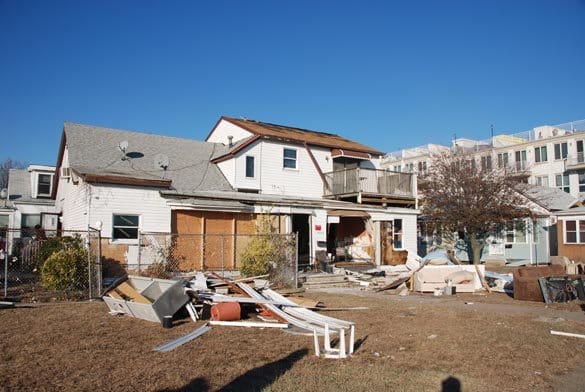Treyger Calls On FEMA To Conduct Review Of Insurance Companies Underpaying Sandy Victims


In the wake of multiple reports that insurance companies underpaid Superstorm Sandy victims by altering damage assessment forms — from Manhattan Beach and Coney Island — Councilman Mark Treyger is calling on FEMA to conduct a comprehensive review of all Sandy payout claims.
A hearing with City Council’s Committee on Recovery & Resiliency last week focused on a resolution by the councilman requesting FEMA to reexamine all National Flood Insurance Program payouts for possible underpayment or denial of payment.
Currently, FEMA plans on sending letters to all Sandy victims who filed a claim alerting them of the possible fraud. Treyger says a letter is insufficient, and maintains that a full review of all filed claims is necessary. The resolution also calls on FEMA to require insurance companies to make available to policy holders all drafts of engineering reports that are used in the assessment of damages.
“After going through so much as a result of Hurricane Sandy, it is outrageous that storm victims are once again being victimized by their insurance companies,” said Treyger. “The stories we have heard of alleged fraud and underhanded tactics by engineers and insurance executives is repulsive and must be fully investigated by the Attorney General and FEMA.”
Brooklyn engineer Harold Weinberg testified at the hearing that his signature was forged from his initial report assessing a Manhattan Beach home onto a rewritten one containing different conclusions. Unlike the other cases of so-called “peer review,” lawyers in this case allege that the individual who altered Mr. Weinberg’s report and forged his signature was not even a licensed engineer.
Also testifying was Mitchell Shpelfogel, a lawyer who is representing several homeowners who believe they are the victims of underpayments by their insurance companies, John Cori of Friends of Rockaway Beach, representatives of New York Legal Assistance Group and Legal Services NYC and members of the public who were impacted by Hurricane Sandy.
The incidents of altered engineering reports first came to light in Long Beach, Long Island, after the initial inspector had written that the home was damaged by hydrodynamic forces, which would have resulted in an insurance payment to the homeowner. However, those conclusions were later rewritten by a second engineer, who was a partner at the firm and had never personally visited the property. Instead, he determined using photographs that the building was not damaged by hydrodynamic forces, but rather by long term deterioration.
The original engineer then added his name to the rewritten report as if it was written by him. This process was concealed from the homeowners, even after they filed a lawsuit and proceeded with discovery. The revised report came to light only as a result of happenstance during the course of testimony. In a later hearing for this case, an insurance company executive refused to answer questions regarding the altered reports, citing his Fifth Amendment rights.
Out of concern that other engineering firms were engaging in this process as well, the judge overseeing that case ordered that defendants in all Hurricane Sandy cases in the Eastern District of New York must provide plaintiffs with a copy of every draft of every engineering report. The resolution proposed by Treyger goes further by requesting that FEMA make these drafts available in all cases where a claim is filed, and not when a lawsuit is filed.
Following the judge’s order, additional instances of possibly rewritten reports began to surface, including for homes in New York City. In one case, the initial report for a home in Coney Island stated that surging floodwaters had washed out the cellar and part of the first floor, while the rewritten report concluded that “there was no evidence” that the flood had caused damaged, even though the home remained uninhabited two years later. Similar accounts have appeared from the Rockaways and other parts of the city, with FEMA already having received about 2,000 complaints against insurance companies.
Treyger and the Committee on Recovery & Resiliency are also working on a proposal to have FEMA create a fund to hire independent engineering firms following natural disasters in order to ensure that payouts are based on accurate damage assessments and not driven by profit.
“I am very concerned that we have only exposed the tip of this problem and that instances of fraud will become much more widespread as more homeowners are required to purchase flood insurance,” Treyger said. “I will continue to work closely with our state and federal partners so that we can enact the reforms needed to end this practice of insurance companies shortchanging storm victims and then forcing them to sue for a fair payout.”
Treyger called the issue is “especially pressing” since many additional New Yorkers will soon be required to purchase flood insurance as a result of the revised federal flood maps, which would open up the possibility for more widespread fraud following future flooding disasters.




